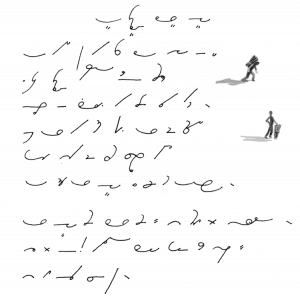Hello,

I prepared this little poem days ago and now I decide to post it. (It’s lighter than the title suggests).
It’s from Nicolas Boileau who wrote very sensitive and thoughtful texts. I thought to write his name at the end, the name of the author is not difficult but the title of the book is puzzling me: « Poésies » : as much as “poète” is easy, “poésies” seems to me impossible without dropping a vowel…
I’m sure that the ones able to read it will appreciate Boileau’s wit…
Edit: Eventually, I agree with all the suggestions made by Carlos… So, here is the update.
Great! I thought at first it was La Fontaine's fable (which by the way, you should also write!).
In the second stanza, the p of pauvre is of the same size as the b of bûcheron.
I think there's a word missing in the next to the last verse of the first stanza: "Plutôt que de s’en ____ accablé de nouveau …"
Since liaisons are not written normally in Sténographie Gregg, shouldn't prompt be written without the blend (p-r-o-n)?
Hi, Carlos!
Yes, you're right for the first point: I would say that the "b" of "bûcheron is too small compared to the "p" of pauvre… I will change it. For the second point, you're also right: "voir" is missing. I will change it too.
For "prompt"… in Études Graduées, it is written the way you say it… and certainly, liaisons are not written normally except in some situations like "est-il" or "dit-il" but… "prompt" is not used anymore in French without being followed by the "à"… so the sound "t" is always heard… I'm hesitating.
For the poems, I can be hard to find not too difficult texts that I like too. They can be a challenge for French Gregg readers… that are not you apparently.
🙂
Well… "prompt" is also used in the idioms "prompt rétablissement" and "prompt retour"…
Maybe I can put the "à" to "prompt" to the general use of "prompt"…
Another thing I was thinking, the ending of the first verse of the second stanza, you wrote cria-t-elle as you would normally write il y a with the opposite circles, but here you could just use the dotted circle for the "ia" sound and write one outline without all those dashes and double circles: k – r – dotted circle – t – e – l. I think it's much easier this way. Check the entry for prier in the passé défini section of the conjugation tables of the manual for a model.
You're right about "cria-t-elle"… it's the correct ending for this kind of past and it's also easier. Another change to make… Thanks!
So you don't have a opinion about my idea for "prompt" ? The language has quite changed since the manuals were published…
I see you brought your monthly gifts: I hope the English readers know how much they're lucky…
🙂
I was thinking that from a writing point of view, isn't p-r-o-n easier to write than p-r-o-nt? You can write p-r-o-n just after a few Gregg lessons. Whereas with the blend, you have to wait until later in the manual.
(Incidentally, I checked the French DJS dictionary, and it is also written p-r-o-n in that series.)
Nevertheless, I also agree with you that the language has changed, even more considering that spoken French is nowhere close to written French.
About the word poésies, if you slant the p almost 45 degrees it will cause the o – e – left s – e to come to a natural less slanted position, making it easier to write. If you start the p too straight, it will be difficult to write the ending of the word.
If my level of Sténographie Gregg were better, I would write something in French. I have so many good French books, quite a few of them with interesting stories and selections about French culture.
For "prompt", I finally agree with your solution: after all, less is better… I made all the changes you suggested.
I tried "poésies" the way you did… the result is a bit convoluted but, indeed, readable… It's better than dropping a vowel: it took time for me to understand the form "vilon", in the Sénécal, means "violon".
Many thanks for your support, and many would agree with me, you do already a lot…
🙂